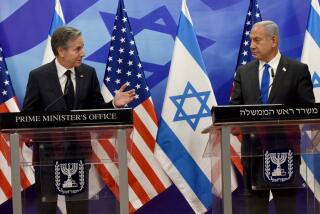Students’ Straw Poll Goes to Peres Amid Election Fever
- Share via
JERUSALEM — Blich High School, Israel’s answer to the New Hampshire primaries, stoked election fever here Tuesday, holding a mock poll that showed Prime Minister Shimon Peres and his Labor Party crushing opposition leader Benjamin Netanyahu and his Likud Party in the upcoming national election.
A secular, middle-class high school in the Tel Aviv suburb of Ramat Gan, Blich began accurately predicting the outcome of Israel’s parliamentary campaigns in 1977, when Likud ended Labor’s 29 years in power.
The results of the vote by juniors and seniors are taken so seriously by Israeli politicians that they spend heavily on the campus campaign and send their best and brightest to woo Blich’s teenage voters.
With the nation expecting Peres to announce next week that national elections will be moved up from Oct. 29 to May 21 or May 28, Blich became the scene of intensive campaigning this week by both Labor and Likud.
At Likud’s final election rally on the campus Monday, Netanyahu announced that the party will unite its list of parliamentary candidates with the far-right Tsomet Party for the upcoming elections. Many pundits thought his announcement was deliberately timed to improve Likud’s showing in the Blich poll, because Tsomet leader Rafael Eitan is popular with youthful voters.
If that was the plan, the effort proved disappointing for Netanyahu. In the race for prime minister, Peres received 61% to Netanyahu’s 39% of votes cast by 97% of Blich’s 780 juniors and seniors.
“I think they voted like adults although adults don’t always vote like adults,” Peres told Israel Army Radio after the results were announced. “They showed maturity, and I thank them.”
Israelis this year will, for the first time, vote directly for prime minister. According to the election law, whoever wins more than 50% in the first round of national voting will be prime minister. If no one earns that much of the vote, a runoff will be held between the two top vote-getters.
In the high-school poll, Labor and its allied left-wing parties received 56% of the votes for parliament, the right-wing bloc 38%, with the balance going to other opposition parties.
“The Blich election results reflect only one thing: a very big gap between the blocs and between Peres and Bibi [Netanyahu],” said Uzi Baram, tourism minister in Peres’ government. “One bloc is gaining momentum, and the other is in real decline.”
But Netanyahu dismissed the results.
“I hope Peres continues to win at Blich, but I intend to win the real elections themselves,” he told Army Radio.
“It’s possible that this time the Blich school won’t reflect the results of the coming elections, contrary to the tradition,” said Likud parliamentary leader Moshe Katsav. “We’ll have to work in order to prove my thesis.”
Pundits cautioned that the Blich poll excluded two important groups in Israeli politics: religious voters, who are about 20% of the voting population, and Arabs, who are 10%.
But the results still were a blow for Netanyahu, who is also trailing in public opinion polls.
More to Read
Sign up for Essential California
The most important California stories and recommendations in your inbox every morning.
You may occasionally receive promotional content from the Los Angeles Times.













